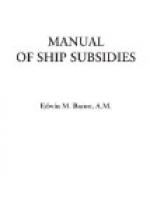The intent of the second bill, “imposing tonnage duties and for other purposes,” was the readjustment of the existing tax upon tonnage so that it should fall “more equitably upon the different classes of vessels affected thereby."[HF] It removed all tonnage, harbor, pilotage, and other like taxes imposed upon shipping by State and municipal authority (except wharfage, pierage, and dockage); and imposed a duty of thirty cents per ton on all ships, vessels, or steamers entered in the United States.
The committee’s measures were ably advocated, but they finally went down in defeat.
* * * * *
In 1872 the Pacific Mail Steamship Company came forward with an offer to add another monthly mail-steamship service to Japan and China, for an additional subsidy of a half million dollars a year. At the same session a project to establish a subsidized line to Australia was introduced; another, for a subsidized line from New Orleans to Cuba. These failed, while the scheme of the Pacific Mail won. A bill authorizing such contract was enacted June 1, that year, after prolonged and warm debates, and by close votes in House and Senate. Two years afterwards it was discovered that bribery had been employed in securing the passage of that act; the charge being that a million dollars had been spent by a corrupt lobby in pushing the bill through.[HG] Upon these disclosures, and because the company had failed to fulfil its conditions, Congress, by act of March 3, 1875, abrogated the contract.[HH] In 1877 the first contract with the Pacific Mail for the Japan and China service, expired. During its ten years’ term the company had received from the Government a total of $4,583,333.33.[HI]
With the Pacific Mail exposure the word subsidy became unsavory to the public taste, and for some years after no subsidy measure, however carefully guarded or respectably backed, could find favor in Congress. A second project for subsidizing a new line to Brazil, proposed by John Roach, the noted American shipbuilder, in 1879, was among those ventured, only to fail.
* * * * *
A decade later, in 1889, when conditions seemed to be growing more propitious, the subject was revived with vigor by the introduction of a navigation subsidy bill proposed by the American Shipping League.[HJ] From this evolved in 1890 a tonnage bounty bill reported in the House by Representative James M. Farquhar of New York.[HK] The final outcome, indirectly, of these moves was the reestablishment of the postal subsidy system, abandoned in 1858, in the enactment March 3, 1891, of what is known as the Postal Aid Law.




